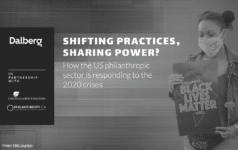Dalberg uses cookies and related technologies to improve the way the site functions. A cookie is a text file that is stored on your device. We use these text files for functionality such as to analyze our traffic or to personalize content. You can easily control how we use cookies on your device by adjusting the settings below, and you may also change those settings at any time by visiting our privacy policy page.
Massive global migration and the ongoing refugee crisis; disruptive technology increasing information access; and rapid job automation are contributing to profound social and economic changes. Social impact leaders are used to shifting priorities and strategies as the social and economic landscape evolves; however, today, they are facing a political disruption of an unprecedented scale.
In the United States and Europe, upwards of 50% of citizens have lost faith in the political system and believe that our political institutions are failing. Amidst this rise in public distrust of political systems, new, populist leaders have emerged and enacted policy changes that have major social and economic ramifications for social impact organizations. In the United States, for example, the looming 2018 budget proposes threats to education, justice, science, and international exchange programs, and social impact leaders now feel the need to fill emerging billion dollar gaps with their millions.
Foundations and Corporations Are Starting to Respond
In a recent survey, roughly half of US Foundation CEOs polled believe that the recent presidential election will negatively impact their organization’s ability to achieve strategic goals, while another quarter have mixed feelings. Accordingly, ~50% of US Foundation CEOs report making – or planning to make – shifts to their goals or grant-making strategies, and we are seeing modest evidence of these changes in action. For example, the Doris Duke Foundation will deploy $2M to help build empathy between Muslim and non-Muslim communities using arts, while the Levi Strauss Foundation issued $1M in grants to support immigrants, minorities, and the LGBTQ community through various initiatives. Others, such as the California Endowment, plan to invest $25M over the next three years to protect safety net programs across the state. This renewed focus on the under-served is not unique to foundations: Google recently created a $4M fund to support immigration organizations
Beyond deploying grant dollars to support at-risk populations, some corporations are leveraging non-financial resources to operate within the rapidly shifting political context. From Amazon, which deployed its legal team to fight the executive order on immigration, to Paypal, which reversed a planned expansion into North Carolina following passage of the ‘bathroom bill’, we are seeing organizations taking a public stand on policy decisions that threaten their goals or values.
Key Questions for the Future
While social impact leaders are demonstrating a desire to shift approach, Dalberg also finds many are grappling with profound questions about their short term actions and medium term strategic trajectory:
- How do I lead, communicate with, and inspire my organization through uncertainty?
- Is standing on the fence even an option in 2017?
- Where should I take big bets or undertake collective action?
- Do funding and policy changes significantly change my organization’s potential for impact?
- Do I understand the beliefs that are driving opposition my organization’s priorities?
Dalberg is interested in understanding how leaders are responding to recent political disruptions, and if they plan to adapt their organizations. Between July and September, we will be leading conversations with diverse, forward-leaning social impact leaders to understand how they are responding, and the risks and opportunities ahead. In our next blog, we will share some early insights from our interviews. In the meantime, let us know what you think on Twitter, tagging @Dalbergtweet.

















